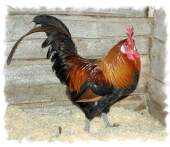posted 12 years ago
It most definitely is an alpha issue, as with most male animals. We've had roosters for the past 37 years and have never had an aggressive rooster...and I can't really imagine that it was sheer luck of the draw that every rooster we have had is just a gentle soul. A rooster is pretty much a rooster,with all the normal rooster instincts and actions. Some are more docile, some more sparky, but in the end they are all only 2 ft. tall and they are prey animals that are...well...chicken. They are small, we are big. They are food, we are predators. They don't have as much brain capacity as do humans, so outsmarting them is pretty easy.
It matters a lot about how they are handled when young~coddling is not how you get a gentle rooster. You don't have to kick them or abuse them but you most certainly need to think like a rooster instead of like a human. Any weakness is seen as...well...weakness. How you walk, how you move in the flock, any indecisive actions or screaming, fluttering of hands, running away when they approach is seen as a weakness and worthy of aggression. Roosters don't feel shame, so carrying him around in front of his hens or pushing him down on the ground in front of the flock evokes no remorse or shame...it really doesn't compute at all. That's human thinking and not chicken thinking.
I've had a few roosters that do the dance and even had one that was not reared by me that attacked my egg basket as I walked by...each of these episodes are like feelers. They put out their game and see how it is received...if you fail the test, you are then seen as one that can be dominated. If you remain calm, move towards them, even elevate beyond their attack (no crowing, flapping or any such nonsense is needed), they will reevaluate their interactions with you.
I responded in another thread on the use of a good, lightweight training rod for roosters who need schooling in interaction with humans~if you've raised them right, it's likely you won't need one....if you inherit a bird that was not raised properly, they come in real handy. When done properly, it is a lesson that may never need repeating. It works well with all ages and it really helps children gain confidence around the birds.
Children who are taught confidence around roosters instead of treating roosters like stuffed animals which have to be picked up and petted every time they are near are going to fair better. What's the first thing a child trained to pick up chickens as pets does? He squats or bends down, with his eyeballs right in striking range, and he is often excited and talking in a high pitched voice while doing so. Not a good thing. Bad training for the child and is setting the rooster up for failure. Same with women who flail around and run when the rooster advances or fluffs up towards them....just an invitation for disaster.
No running, calm strides, facing the rooster if he advances and continuing forward...the first to back down is the weakest. All of this is learned behavior and it's a parent's job to teach it...every problem isn't going to be solved by killing the animal or removing the potential problem. Understanding how to work livestock can be a real confidence builder for youngsters and can help them learn to cope in other areas of their life.
In the end, if you avoid all possible dangers for your children, instead of teaching them how to handle them appropriately, then life doesn't get any easier for them. They will never cross the road without you, never ride a bike, never drive a car, never learn to swim, never walk in the woods where snakes, bees, or wildlife reside. If living with livestock is a life choice, then learning to live around them safely is pretty important.































 5
5












 1
1






























